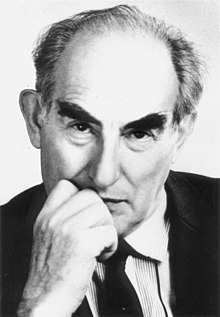Vitaly Ginzburg
| Vitaly Ginzburg | |
|---|---|
 |
|
| Born | Vitaly Lazarevich Ginzburg October 4, 1916 Moscow, Russian Empire |
| Died | November 8, 2009 (aged 93) Moscow, Russia |
| Nationality | Russia |
| Fields | Theoretical Physics |
| Institutions | P. N. Lebedev Physical Institute, Russian Academy of Sciences |
| Alma mater | Moscow State University |
| Doctoral advisor | Igor Tamm |
| Doctoral students | |
| Known for | |
| Notable awards |
|
| Spouse | Olga Zamsha Ginzburg (1937–1946; divorced; 1 child) Nina Yermakova Ginzburg (m. 1946) |
Vitaly Lazarevich Ginzburg, ForMemRS (Russian: Вита́лий Ла́заревич Ги́нзбург; October 4, 1916 – November 8, 2009) was a Soviet and Russian theoretical physicist, astrophysicist, Nobel laureate, a member of the Soviet and Russian Academies of Sciences and one of the fathers of the Soviet hydrogen bomb. He was the successor to Igor Tamm as head of the Department of Theoretical Physics of the Lebedev Physical Institute of the Russian Academy of Sciences (FIAN), and an outspoken atheist.
He was born to a Jewish family in Moscow in 1916, the son of an engineer Lazar Yefimovich Ginzburg and a doctor Augusta Wildauer, and graduated from the Physics Faculty of Moscow State University in 1938. He defended his candidate's (Ph.D.) dissertation in 1940, and his doctor's dissertation in 1942. In 1944, he became a member of the Communist Party of the Soviet Union. Among his achievements are a partially phenomenological theory of superconductivity, the Ginzburg-Landau theory, developed with Lev Landau in 1950; the theory of electromagnetic wave propagation in plasmas (for example, in the ionosphere); and a theory of the origin of cosmic radiation. He is also known to biologists as being part of the group of scientists that helped bring down the reign of the politically connected anti-Mendelian agronomist Trofim Lysenko, thus allowing modern genetic science to return to the USSR.
...
Wikipedia
